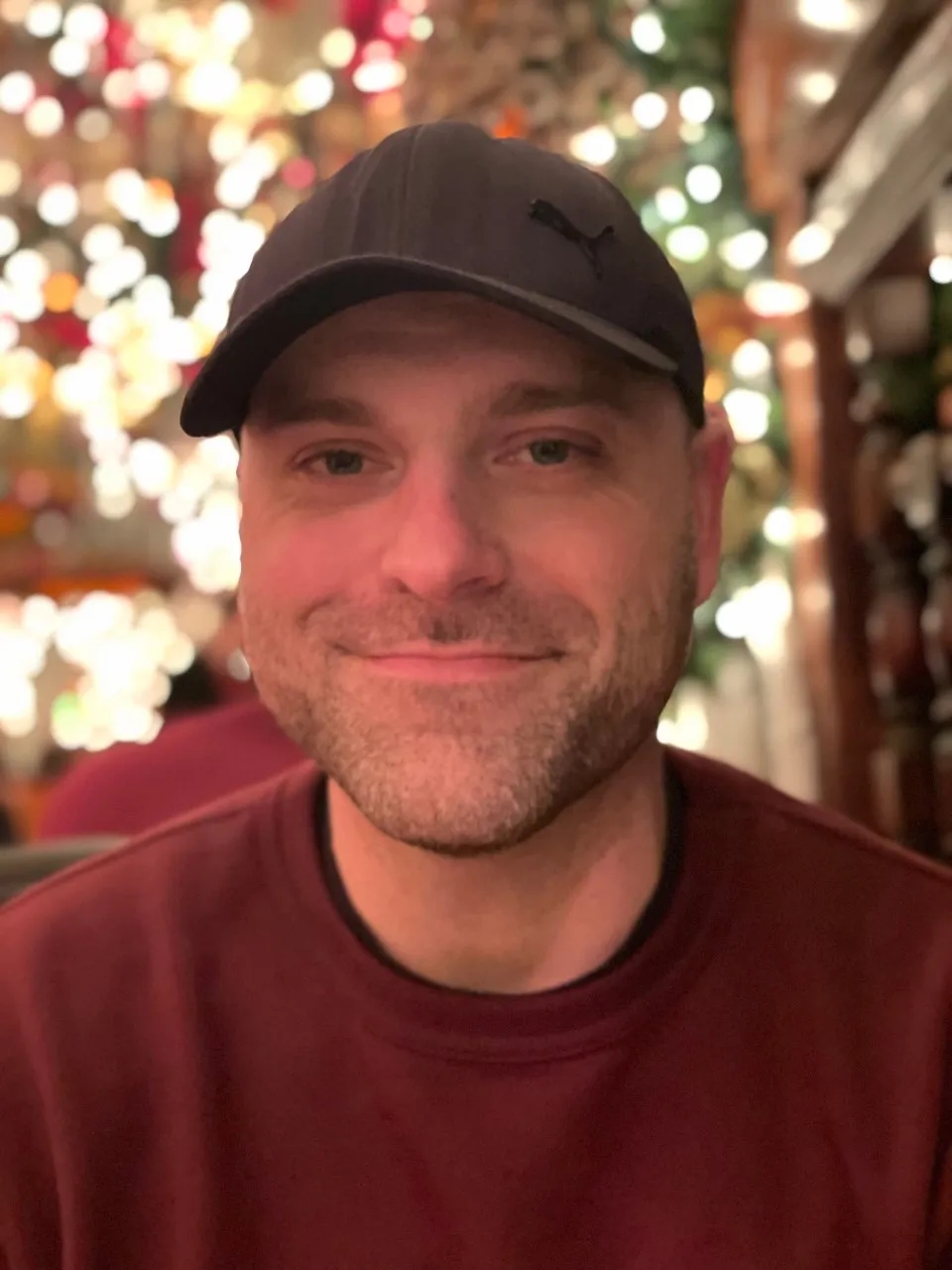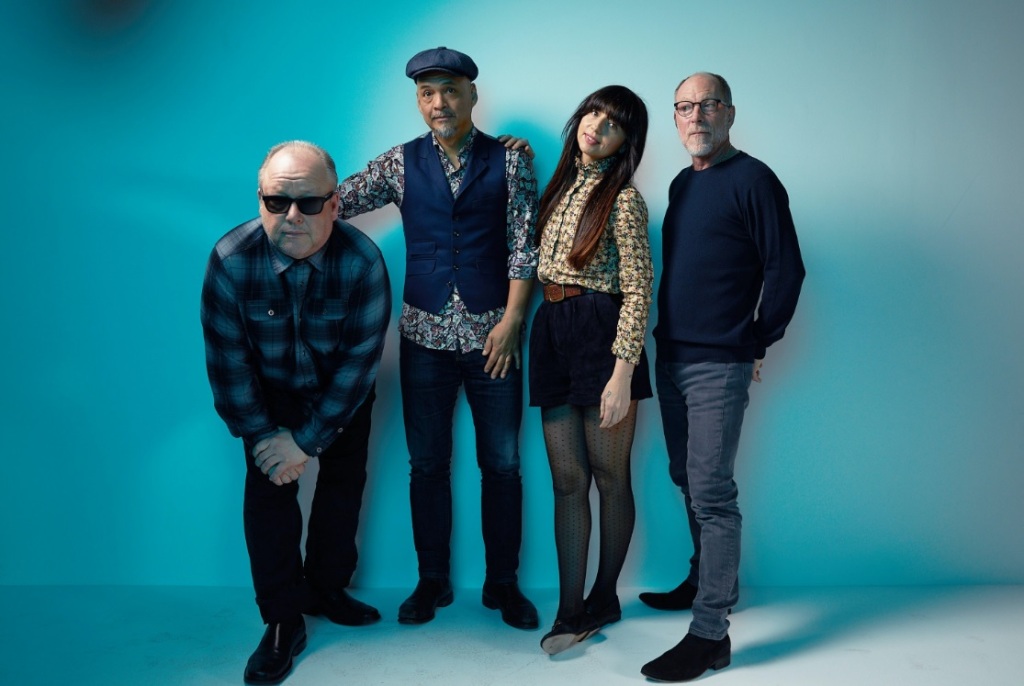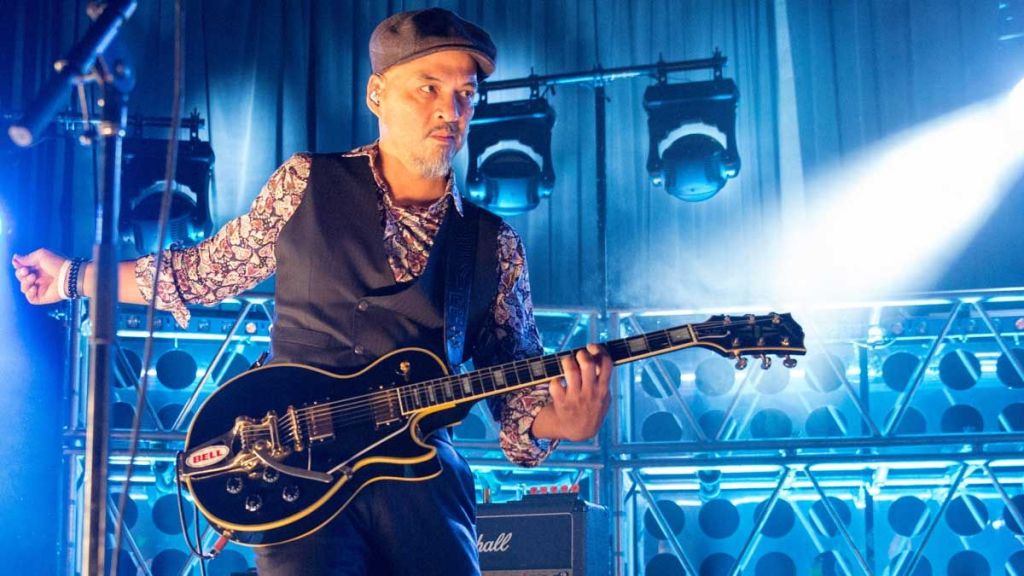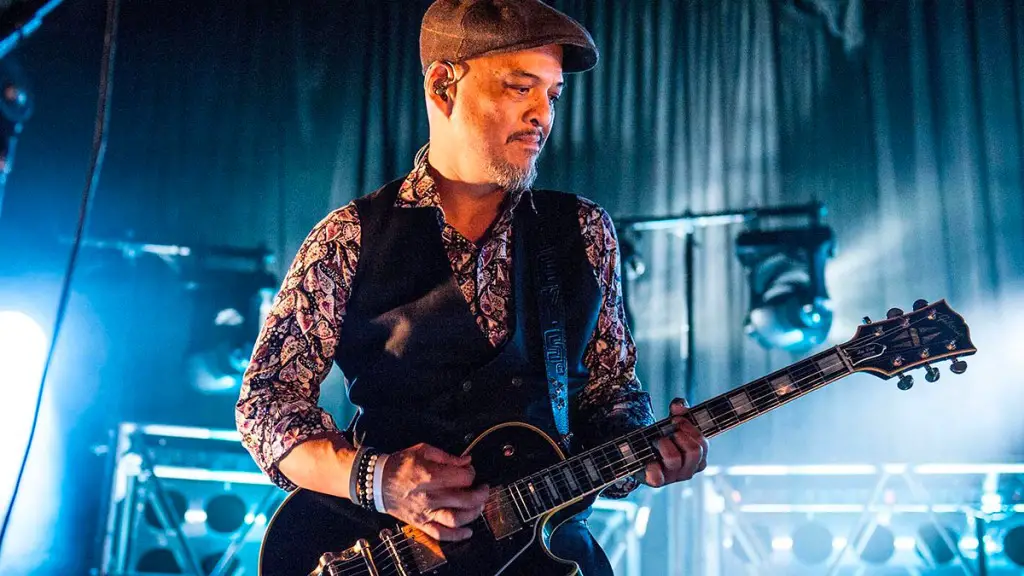All images courtesy of HER-Fitz PR/Credit: Travis Shinn

By Andrew Daly
andrew@vinylwriter.com
Far from beholden to the past, guitarist Joey Santiago’s eclectic nature finds both him and the Pixies in perpetual motion.
It would be too easy for the Pixies to revisit tired old tropes. Instead, Frank Black, Paz Lenchantin, David Lovering, and Joey Santiago are treading new ground. Ground that sees the Pixies exploring longer and more mature arrangements while still retaining the quirky complexity that the Boston-bred indie act has become known for.
“People think they want new music and different things,” said Santiago. “But then when you do it, they always say, ‘Well, where’s “Here Comes Your Man” or “Debaser?’ And if we did one that harkens back, well, they’re probably gonna fucking hate it too, and say, ‘Oh, well, it’s not as good as those old albums. Why not try something new?’ Right? Noone’s ever gonna be happy, so we’re gonna be the ones in charge, and we’ll make the music that we wanna make.”
Some eighteen years into their second act, the Pixies’ latest record Doggerel serves as a verifiable breeding ground of chemistry, culminating in the foursome’s strongest outing in years. More so, it seems that the band’s current lineup has fully hit its stride to wonderous results.
“I feel really close to this record,” Santiago chattered. “I call Doggerel a true mature continuation. To me, this is almost like Doolittle senior; it’s like the grown-up version of Doolittle.”
Now four records into its reunion, the Pixies are a different band than we knew in the late ’80s and the early ’90s. While those records and those songs will live on forever, and certainly Black and company are fully capable of summoning old ghosts, a harmonious stillness has seemingly fallen across the lands of the Pixies.
“Man, back then, we were arrogant, and we were ungrateful,” Santiago lamented. “We didn’t realize what we had, or maybe we just got so in our own heads that we didn’t care. We took it all for granted at a time when the people around us – all the other bands in our orbit – would kill for what we had. The biggest difference I see after reuniting is that we aren’t ungrateful anymore. Things are just good now, and we’re not taking any of this for granted. To be able to play together is a great thing.”
In the midst of promoting the Pixies’ latest record, Doggerel, Santiago recently checked in with me via zoom to run through the Pixies’ creative process, the current state of the band, and the Pixies’ collective mindset as they move forward.
Andrew:
Take me through the genesis of the Pixies’ latest record, Doggerel.
Joey:
Well, the studio time was booked, so we had to get the songs ready. And that’s how it started. What I’m saying is we really won’t do anything until we officially know something is going on. I mean, if I could speak for Charles [Frank Black], I don’t think he – and I’ve heard him say it – he doesn’t necessarily write every day. He doesn’t get inspired every day; he gets inspired when things have to be done. Even back when we started in the beginning, when we first moved to Boston, we timed people’s sets. If the opening band was playing for like 25 to 35 minutes, we would time-out what songs we had, and we would be like, “Okay, well, we need five more minutes,” before we could even think about playing live.
Andrew:
As I understand it, Frank brought around 40 songs into the studio. How did the band tease through those tracks?
Joey:
The ones that made onto the record were our producer’s choice. He probably knew what kind of record he wanted and what was going to sound good. Because there were 40 to choose from, and if we had to choose – for the four of us in the band to choose – it would be a mess. And those 40 songs came in from Charles, in like, I don’t know, mostly within a week. Charles would keep sending emails, like two or three a day, and they just kept coming, so before we even went into record, we knew we had a lot to work with. But if we tried to choose, we’d never get anywhere, and we know that. So, we let out producer Tom Dalgety choose, and that worked out really well.
Andrew:
You’ve been working with Frank for a long time, Joey. Break down your working relationship and how that’s evolved over the years.
Joey:
You know, it’s pretty simple for us. It’s usually always the same; Charles would come up with chord progressions, I would come up with something on top of it, and he would trust me with it. Sometimes it’s a little guitar line that’s embedded in the song that he wrote already, so those are sometimes in there inherently when I get it. Usually, the music comes first, and then the lyrics are last. Sometimes the melody isn’t even there yet, but Charles is working on it in his head. I won’t always know it, but I think it’s secretly there in his head, and maybe he’s waiting to see what I come up with without me knowing what he knows. But regardless of any of that, the lyrics always come last.
Andrew:
I wanted to touch on “Dregs of Wine.” Walk me through the creation of that track.
Joey:
I was just playing around right here on this couch with an old guitar acoustic guitar that I had just bought.
I was messing around, and I just ran into something, and I went with it. From there, it came together fairly quickly. But that was one of mine – I had a bunch of them – I think I handed in like six, but not all of them made it onto Doggerel. I’m probably going to save them and use them on our next record.

Andrew:
As I was listening to the record, “There’s a Moon On” and “Pagan Man stood out. What was your approach?
Joey:
Well, “There’s a Moon On” was recorded first, and I know “Pagan Man” was actually one of the very last tracks we recorded, period. But with “There’s a Moon On,” there were some chords already there to work with from Charles, so like I said before, it was my turn to lay something over the top of that. I wanted to make something like a wolf howling type of sound, and that never really came about, obviously. But from me trying to do that, what you hear on the record came to be, and it was just this simple thing I came up with, but it works. But what’s really interesting is the thing that I try and avoid the most is pentatonic scales, but “There’s a Moon On” had it because it needed it. I don’t like using them, but I knew it was going to fit. It’s kind of embarrassing, but it really does work.
Andrew:
What is it about pentatonic scales that you dislike?
Joey:
I try and avoid them at all costs because they’re just so overdone. It’s really the most overused scale, and for me, because it’s so common, it’s a good one to try to avoid like the plague. The way I look at it is if you’re gonna use pentatonic scales, well then you are gonna sound square, you know? I think that’s why every one of our albums is kind of different because I’m not choosing those shapes. Instead, I am intentionally avoiding it, and it leads to some unique sounds and takes us to different places.
Andrew:
Circling back to “Pagan Man,” which is one you’re responsible for. How did that one come about?
Joey”
I’m responsible for that? Oh, boy. [Laughs]. So, with that one, I did the lyrics for that, which are just silly. I mean, Charles is one of the best lyricists there is, but I think he just got burnt out, so he emailed me and said, “Give it a shot.” And I said, “Are you kidding?” But I did; I gave it a shot. So, I was mumbling different things, and I heard “Pagan Man,” and from there, I started adding, changing, and rearranging things until they made sense. And then the rest of the words were phonetics, but it made a story, and while it’s a bit silly, and maybe not what Charles might have done, I think it came out alright.
Andrew:
You also penned the lyrics for the album’s title track and closer, “Doggerel,” right?
Joey:
Yeah, I did, and it was kind of the same story as “Pagan Man,” I came up with them the same way. But, supposedly, I changed the vibe of that song by coming up with this one guitar part. So, we’ll get what the schedule is for the day, and it’s like, “Joey, I need you at this time, around 3 pm.” So, I got the schedule, and I came down to the studio to work on “that song, “Pagan Man,” and I actually only had one idea for it. So, I played it to them, and Charles just went, “Oh, my God, you just changed the whole vibe of this.” And that was a relief because that was the only thing I had for that song. That was it. [Laughs]. So, if they didn’t like it, then I would have had to come up with something else, and I had nothing else.
Andrew:
Doggerel seems to feature a certain maturity and evolution of arrangements. Can you expand on that at all?
Joey:
I agree. I’m glad you hear that too. We’ve moved past just having everything be three minutes. Now, we love stacking the sandwich; that’s what we call it. We’ve got a process now where maybe Paz [Lanchantin] would say something, and then I would kind of know what was going to happen from there arrangement-wise. I think it’s just more crafty, and while that could be a double-edged sword for us, at the end of the day, the song is the boss, you know? I mean, the songs and the maturity of the band will dictate what’s gonna happen to this song or that song.

Andrew:
This record feels like a true amalgamation of all your influences. Would you agree?
Joey:
Yeah, it does. But if you asked me what I was listening to when we recorded it, I couldn’t tell you. I mean, for example, I just came home, and I was listening to music on my iPhone, and I had on “Take Five” by Dave Brubeck from the Time Out record. I had on Take Five because I love the drum sounds, and I also liked the song, and it inspires me guitar-wise. I’m all over the place, and I think the whole band is that way too, but we’re able to bring it all together, and that’s where the special sound of the Pixies comes from.
Andrew:
In my estimation, Doggerel is the best record of the Pixies’ modern era. What is it about this lineup that’s created such innate chemistry, always keeping the band moving forward?
Joey:
Well, recording with Tom Dalgety has helped. He’s familiar with us as this is our third record with him. And then with Paz, she’s gotten into the swing of things, and that’s been huge. I think we figured it out; we subconsciously found a place between moving forward and keeping the identity of the band. I think we hit the sweet spot on that, but that took a while.
Andrew:
Does the band ever feel beholden to its past?
Joey:
I’m speaking for myself again, but when we first got back together, we talked about this a little bit because there’s a risk, right? With us, we’re kind of like this “legacy band,” and we probably, okay, we definitely are. So, we reunited, we’re gonna make this new album, and the double-edged sword is,
are we going to move on? Are we going to explore new territory, try new things, do longer songs, and have more mature arrangements? Can we have solos that aren’t too crazy or too wacky? Or are we gonna go back to the past? It’s a no-win situation for us, so we would rather venture forward because as much as people want to say that they want new music, they really don’t, right?
Andrew:
Would you say that, at this time, the Pixies feel completely reinvigorated?
Joey:
Absolutely. We really do, and it’s because we’re comfortable with each other, and we finally know how to work with each other again. I think we got the kinks out from recording new stuff. And that took a while, but we had the comfort of doing that and getting those kinks out. For me, the biggest thing was getting back into the headspace of creating stuff, taking chances, and not being afraid to stumble upon things. I was never really afraid of it per se, but this time around, it seems like I’m freer. And with that, I think that as a band, we’re freer to just be ourselves. And my playing has grown up in a good way too. It still doesn’t sound generic to me; as I said before, that’s something I strive for.
Andrew:
What sort of gear did you use on this record, and will you be using the same guitars on tour?
Joey:
Lately, I’ve been using this custom guitar I got this from this luthier nearby. It looks like a Les Paul, but it’s a Pavel. Aside from that, I use all Gibson’s, and then I’ll have my black Les Paul that I’m always playing live. But I pretty much stay with the same instruments all the time. Whatever I use in the studio is probably what I’ll use when we play live to maintain the same sound. Charles is the same way, and so are both David [Lovering] and Paz. Aside from the new stuff, it’s the same martial that we’ve had since the beginning of time, so we like to use our tried and true instruments so that we’re comfortable.
Andrew:
To what do you attribute the longevity of the Pixies, Joey?
Joey:
Okay, I’ll do the one-two punch here. I’ll attribute our short-lived first go around to one thing, and it’s really simple: we were ungrateful little fuckers. We just couldn’t find the good in anything anymore, and that’s really fucking sad looking back. It all just became a pain in the ass, but what we really were was ungrateful; we didn’t see clearly. Because many people would kill for what we were then, and what we were doing, you know? But now, having been reunited for all these years, it just feels good. We are very blessed. We can play anywhere in the world. We really can. So, I would just say that we’re not taking anything for granted now. We’re grateful now.

– Andrew Daly (@vwmusicrocks) is the Editor-in-Chief for www.vwmusicrocks.com and may be reached at andrew@vinylwriter.com





Leave a Reply